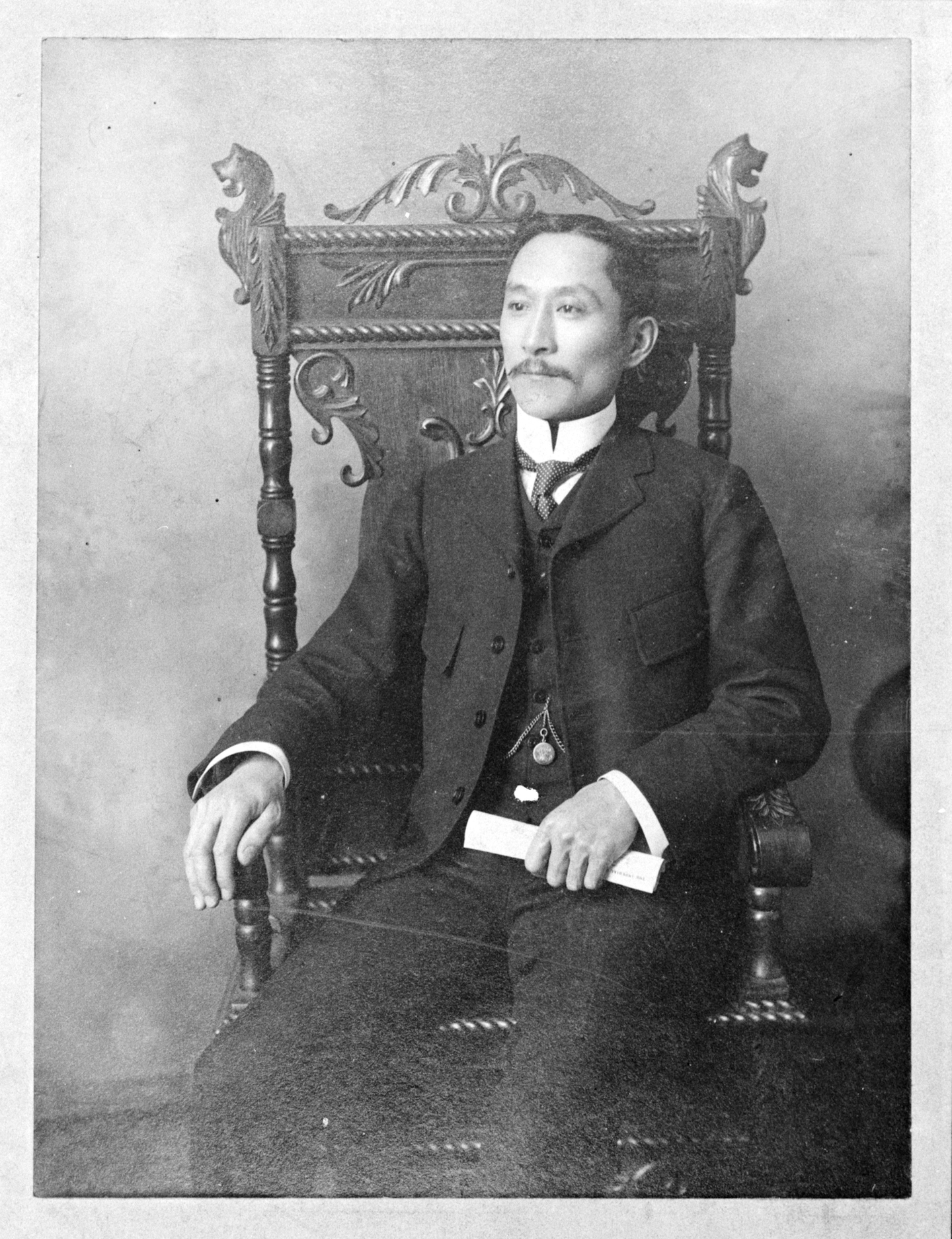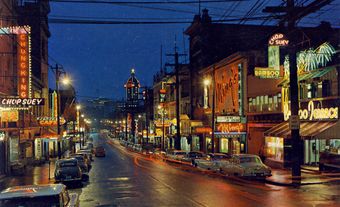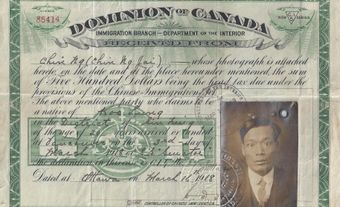Won Alexander Cumyow (溫金有), activist and interpreter (born around 21 March 1861 in Port Douglas, BC; died 6 October 1955 in Vancouver). Won Cumyow was the first Chinese Canadian born in British North America, which became Canada. He knew several languages, which assisted his work as a Chinese community leader and court interpreter.

Background and Family
Won Alexander Cumyow’s father, Won Ling Ling, and mother, Wong Shee, belonged to the Hakka ethnic minority. They had immigrated to British Columbia from California after initially leaving Guangzhou (then known in English as Canton) in China. The couple ran an outfitting store for miners, notably during the Cariboo Gold Rush. At around that time, Won was born in Port Douglas on 21 March 1861. Since there were few Chinese women in British North America, Won was the first Chinese Canadian to be born in present-day Canada. His parents’ choice of Chinese name, Cumyow (金有) — literally, “gold have” — was likely a reflection of the Gold Rush period in which he was born.
Growing up, Won learned to speak multiple languages, including Hakka, Cantonese, English, and Chinook Wawa. By the 1870s, the family had moved to New Westminster, where Won completed his education and training in law. In 1888, using his language skills, he became a Chinese and Chinook court interpreter for the Vancouver Police Department, a position he held until his retirement in 1936. He also ran a variety of businesses, including a coffee and tea company, as well as an opium import operation, until the latter became illegal. Won also worked as a labour contractor and a landlord.
In 1889, Won married Ye Eva Chan, who was originally from Hong Kong. Together they had ten children.
Early Experiences with Racism
Despite being ambitious and skilled, Won Cumyow faced considerable racism and discrimination. Like many Chinese Canadians of the time, Won had to live with unjust policies created by white-dominated communities and governments.
In 1885, while living in Victoria, Won was accused of forgery by his white business partner, Edward Johnson. Forced to stand trial in front of an all-white jury and judge, he was convicted and sentenced to three years in prison, despite the fact that Won claimed the evidence against him had been manipulated and that he had not had time to prepare a defence prior to the trial. While it is unclear whether Won actually did commit fraud, the justice system, coupled with racial prejudice against Chinese Canadians, likely had a role in turning the odds against him.
Despite training to be a lawyer, Won was unable to take the bar exam and become a lawyer because he was not on the voter list. This was due to the fact that Chinese Canadians, unlike white Canadians, were largely denied the right to vote. British Columbia had started stripping Chinese Canadians of the right to vote as early as 1871. While Won managed to register on the BC voter list of 1898 because he was born in Canada, it is unclear whether he voted in the 1890 election. He later attempted to register to vote in 1902, but his request was ignored. In 1903, Won applied to become a notary but was once again denied the opportunity due to being unable to vote.
Chinese Canadian Activism
Won Cumyow was an activist for Chinese Canadians’ rights for much of his life. The community faced many injustices and racist restrictions, which Won and other Chinese Canadians fought to overcome. These policies included, among others, the Chinese Head Tax, the disenfranchisement of Chinese Canadians, and racial segregation.
While in Victoria, Won helped found the Chinese Consolidated Benevolent Association (CCBA) in 1884. The CCBA was an important advocacy group for Chinese Canadians that aimed to push back against discriminatory policies. The organization also doubled as a makeshift government body for the community.
In 1902, Won presented to the Royal Commission on Chinese and Japanese Immigration. He argued that it was mutually beneficial for white Canadians and Chinese Canadians to work together. He pushed against restrictive immigration policies, stating that Chinese people would “greatly aid in the development of this great country.”
When in 1922 the Victoria School Board attempted to racially segregate Chinese students from other students, the students refused and went on strike to protest this policy. Won and the CCBA played an important role in this regard by supporting the strike. Won argued to the school board that segregation would only end up furthering the divisions between Chinese and white Canadians.
Won not only advocated for Chinese people in Canada but was also involved in trying to effect change in Chinese politics. He helped found the Chinese Empire Reform Association in 1899, which aimed to help develop China through progressive reforms.

Won continued to be involved in the Chinese Canadian community for many years through various different roles and organizations. In 1920, he became the president of the Vancouver branch of the CCBA.
Later Life
In 1936, Won Cumyow retired from his court interpreter position. He was replaced by his son, Gordon Wo, the first Chinese Canadian to study law at the University of British Columbia.
Voting rights were finally restored for Chinese Canadians in 1947. Won, after years of advocating for voting rights, cast his vote in the 1949 federal election at the age of 88.
On 6 October 1955, Won passed away at the age of 94, leaving his brother, eight surviving children, eight grandchildren, and two great-grandchildren. In 1923, one of his grandchildren, Cecil Sit-shiu Lee, became the first fourth-generation Chinese Canadian.
Legacy
Won Cumyow’s activism and involvement in various organizations left a lasting impact on Chinese Canadian history. The Vancouver CCBA would continue to advocate for Chinese Canadians’ rights, notably in reforming the Canadian immigration system.
In life and in death, Won was featured in multiple newspapers, including the Vancouver Sun and the Daily Province.
In 2016, there were calls for a new Vancouver school to be named after him, but ultimately the name Crosstown was retained.
In 2020, Won was shortlisted by the Bank of Canada for the new redesigned five-dollar bill alongside seven other important historical figures: Francis Pegahmagabow, Fred Loft, Isapo-muxika, Lotta Hitschmanova, Pitseolak Ashoona, Robertine Barry, and Terry Fox.

 Share on Facebook
Share on Facebook Share on X
Share on X Share by Email
Share by Email Share on Google Classroom
Share on Google Classroom

